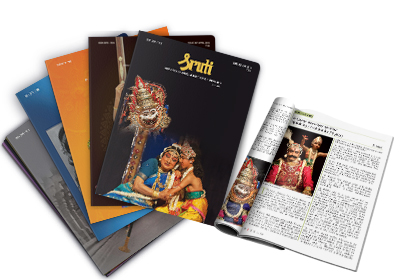COVER STORY
Guruvayur Dorai: Mridangam his passion
USHA BHARADWAJ
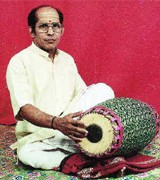
It was the dream of Guruvayur Krishna Vadyar, a priest, to make his son a mridangist par excellence, and this dream got translated into what mridanga vidwan Guruvayur Dorai is today. The veteran percussionist who turns 81 this year, willingly travelled down memory lane for Sruti, confessing that he was thoroughly enjoying himself.
Dorai was born on 2 July 1935. Music was always in the air; growing up in Guruvayur, Kerala, close to the Guruvayurappan temple, he had the golden opportunity of listening to musicians of high repute every now and then. As their house was on North Mada Street his father played host to all the musicians who visited the temple. His father’s earnings were quite meagre. As a five year old, Dorai displayed his prowess and interest in layam. He says that his fingers were drumming all the time on any object he could lay his hands on. This was noticed by his father. It was at this tender age that polio struck him and his father was quite convinced that other than music, his son would not be able to pursue any other career.
SPECIAL FEATURE
ALATHUR BROTHERS (part 2) - The years without Subbier
T.T. NARENDRAN
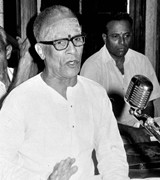
Alathur Brothers (part 2)
Srinivasa Iyer was devastated by the loss of Subbier. The void left by Subbier seemed unbearable. He was not sure at all that he wanted to perform alone. He also wondered if audiences would accept him as a solo performer.
A few music colleges approached him with invitations to take on teaching assignments but Srinivasa Iyer was reluctant. He felt lost. It is said that Subbier, when he knew the end was near, spoke to Palghat Mani Iyer and a few other well-wishers, expressing his fear that Srinivasa Iyer would choose to stop singing. He requested them to ensure that Srinivasa Iyer carried the baton. Mani Iyer did speak to Srinivasa Iyer in a convincing manner and asked him to continue performing. He argued that serving music was the bigger cause; the younger generation must have an exposure to the Alathur school of music. He stayed in Srinivasa Iyer’s house at Tiruchi for a couple of weeks, consoled him and encouraged him to perform alone. Srinivasa Iyer started practising to sing solo; these were late night sessions, from 10 pm to 2 am! Mani Iyer played mridangam for him during these sessions. Gradually, he succeeded in persuading Srinivasa Iyer to take the stage as a solo vocalist. He also accompanied him on the mridangam for many concerts.
THE MS CENTURY
She pledged her soul to song
RAMESH VINAYAKAM
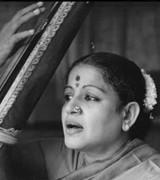
As a boy of ten, waking up early in the morning, I would take my appointed place by the side of a window in our home, with my books, to study albeit reluctantly. I would look at the silent street bereft of traffic and listen to the happy chirping of the birds I could never see; hear the sound of clattering vessels from the kitchen but my mother working behind the walls, I wouldn’t see; and then the strains of Bhaja Govindam from the gramophone record, would reach my ear, from a voice I never knew whose; in words I never understood what; of meaning I could not comprehend yet; but, only a sense of eternal peace would fill me, engulf me and entrance me, day in and day out, that all was well in the whole world.
A thing of beauty is a joy forever, wrote Keats, and continued with even more profundity to say, its loveliness increases; it will never pass into nothingness.
PROFILE
CHARUKESI S. VISWANATHAN: Six decades as a writer
R.V. RAJAN
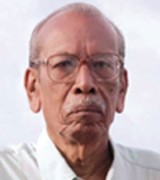
The article was published in Madras Musings. We publish edited excerpts.
When I asked freelance journalist and music critic Viswanathan Subramaniam why he chose ‘Charukesi’ as his pen name, he said, “Initially I was writing in my original name, but my good friend ‘Vadoolan’ said Viswanathan was a very common name and suggested this instead. I was not even aware then that it was a name of a popular raga.” Charukesi certainly did not imagine then that one day he would be asked to write music reviews. Though he had no formal training in music, he picked up the knowledge over a period of time. “I used to attend three to four concerts of Carnatic and Hindustani music every week. With the help of some reference books, I slowly picked up the format and began writing reviews.”

